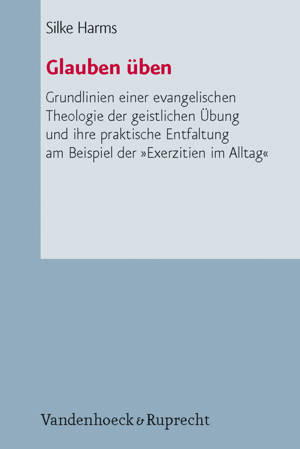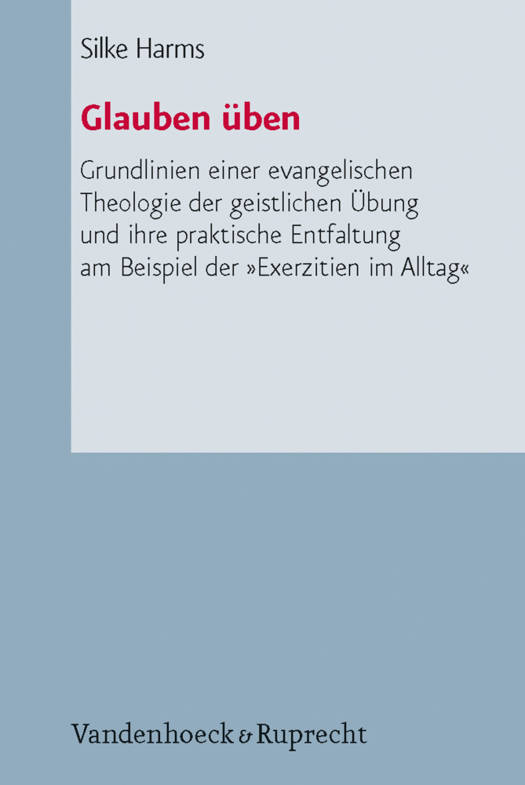
- Retrait gratuit dans votre magasin Club
- 7.000.000 titres dans notre catalogue
- Payer en toute sécurité
- Toujours un magasin près de chez vous
- Retrait gratuit dans votre magasin Club
- 7.000.0000 titres dans notre catalogue
- Payer en toute sécurité
- Toujours un magasin près de chez vous
Glauben Uben
Grundlinien Einer Evangelischen Theologie Der Geistlichen Ubung Und Ihre Praktische Entfaltung Am Beispiel Der Exerzitien Im Alltag
Silke Harms
Livre broché | Allemand | Arbeiten zur Pastoraltheologie, Liturgik und Hymnologie | Arbeiten zur Pastoraltheologie, Liturgik und Hymno | n° 67
140,45 €
+ 280 points
Description
English summary: Ascetics - the reflection on spiritual exercises - has for a long time been the poor cousin of practical theology. The question whether one can exercise faith has been less frequently looked into than the question whether one can learn faith. Silke Harms investigates the significance of exercise for Protestant theology and practise. She demonstrates that in present times the communication of the content of faith requires the practical initiation into Christian living. Harms takes an exemplary look at the course Exercises in Daily Life which has its origins in Jesuit spirituality and has become increasingly popular in the Protestant church in Germany since the 90s. She not only expounds the way in which the exercises were adopted into Protestant praxis - which was a remarkable process from the point of view of church history -, but she also demonstrates that spiritual exercises can be applied with good reason to the Protestant heritage. The author unfolds the significance of Martin Luther and Friedrich Schleiermacher for modern Protestant ascetics by means of a detailed analysis of their writings. A distinct feature of spiritual exercises in the Protestant church is the emphasis on the relational-communicative dimension. The aim is not perfection but the transformation through an existential encounter with the living God. Exercise is done within the polarity of individuality and sociality, activity and passivity, and everyday life and special times and places. Protestant ascetics has to ascertain that all three polarities are kept in balance. german description: Aszetik - die Lehre von der geistlichen Ubung - war lange Zeit ein Stiefkind der Praktischen Theologie. Die Frage, ob man Glauben uben kann, wurde bisher weit weniger bedacht, als die Frage, ob man Glauben lernen kann. Silke Harms untersucht die Bedeutung der Ubung fur die evangelische Theologie und Praxis. Sie weist nach, dass die Vermittlung von Inhalten des Glaubens in der Gegenwart notwendig einer Einubung in christliche Glaubensvollzuge bedarf. Exemplarisch nimmt Harms das ursprunglich aus jesuitischer Praxis erwachsene und seit den 90er Jahren verstarkt auch in der evangelischen Kirche popular gewordene Kursmodell der Exerzitien im Alltag in den Blick. Sie zeigt nicht nur den Weg dieser kirchengeschichtlich bemerkenswerten Ubernahme der Exerzitien in evangelische Praxis auf, sondern legt dar, dass sich das geistliche Uben mit gutem Grund auf protestantisches Erbe beziehen lasst. Anhand einer ausfuhrlichen Untersuchung der Schriften von Martin Luther und Friedrich Schleiermacher entfaltet die Autorin die Bedeutsamkeit dieser beiden Theologen fur die evangelische Aszetik der Gegenwart. Geistliche Ubung innerhalb der protestantischen Kirche zeichnet sich durch die Betonung der relational-kommunikativen Dimension aus. Ihr Ziel ist nicht eine Meisterschaft, sondern eine Verwandlung durch die Begegnung mit dem lebendigen Gott. Ubung geschieht in der Polaritat von Individualitat und Sozialitat, von Aktivitat und Passivitat und von gewohnlichem Alltag und besonderen Zeiten und Orten. Evangelische Aszetik hat sicherzustellen, dass alle drei Dimensionen im Blick behalten werden und keine einseitige Beschrankung auf einen der jeweiligen Pole erfolgt.
Spécifications
Parties prenantes
- Auteur(s) :
- Editeur:
Contenu
- Nombre de pages :
- 288
- Langue:
- Allemand
- Collection :
- Tome:
- n° 67
Caractéristiques
- EAN:
- 9783525570166
- Date de parution :
- 15-08-11
- Format:
- Livre broché
- Format numérique:
- Trade paperback (VS)
- Dimensions :
- 155 mm x 232 mm
- Poids :
- 511 g

Les avis
Nous publions uniquement les avis qui respectent les conditions requises. Consultez nos conditions pour les avis.






